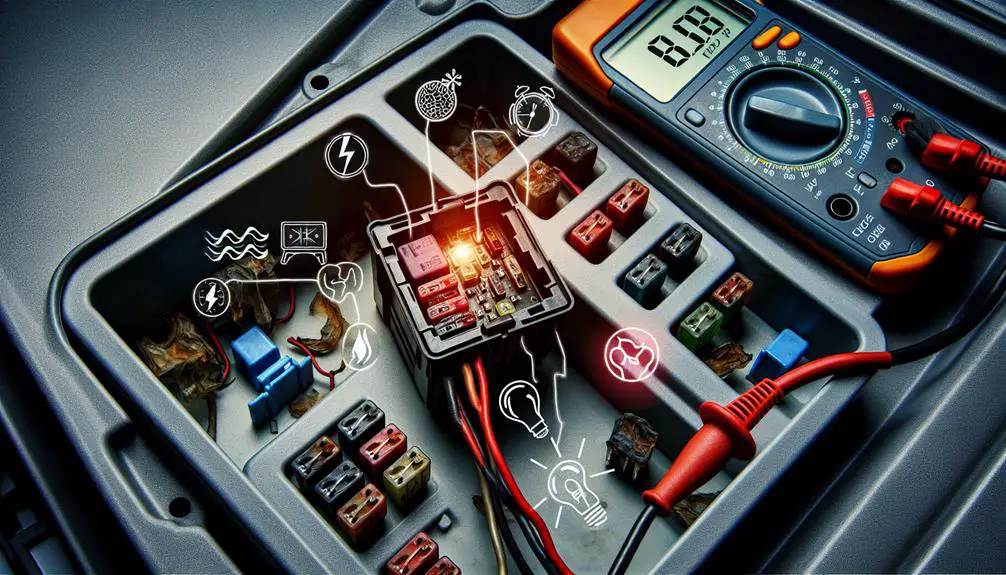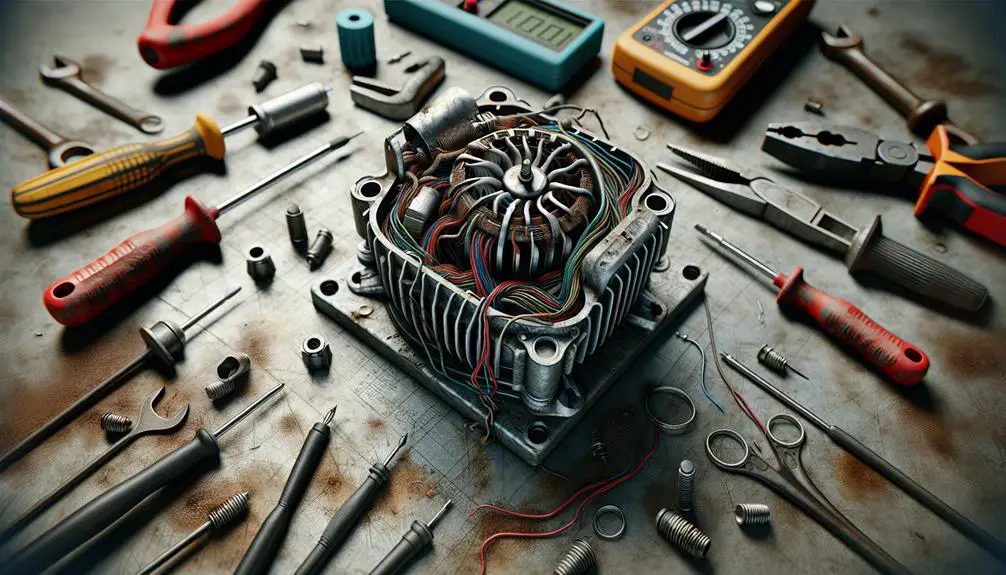- Blower motor not working reasons include:
- A blown fuse,
- Faulty wiring,
- A clogged filter,
- A defective blower motor resistor, and
- A malfunctioning motor itself.
Blown Fuse Issues

One common reason your blower motor isn't working is a blown fuse. This tiny component plays an important role in protecting your vehicle's electrical system. When there's an electrical overload, the fuse blows to prevent damage to the blower motor and other components. You can usually find the fuse in the fuse box, often located under the dashboard or near the engine compartment of your car.
If you suspect a blown fuse is the culprit, you'll want to check your vehicle's manual to identify the specific fuse associated with the blower motor. Once located, inspect the fuse. If the metal wire inside is broken or the glass appears cloudy, it's time for a replacement. Fuses are inexpensive and easy to replace. However, remember, it's important to use the correct amperage for the replacement to avoid further issues.
It's also worth noting that if the new fuse blows shortly after replacement, you might be dealing with a more significant problem that's causing the fuse to blow in the beginning. This could indicate an electrical overload or a short circuit within the blower motor system. While the fuse replacement might get your blower running temporarily, it's important to address the root cause to prevent future failures.
Faulty Wiring Connections
Faulty wiring connections can also cause your blower motor to stop working, demanding immediate attention. It's not just about a blown fuse or mechanical failures; sometimes, the issue lies within the maze of wires connected to your blower motor. Over time, these connections may loosen, corrode, or suffer damage, leading to intermittent or complete loss of function. You've got to keep an eye out for signs of wiring troubles, such as unusual noises before the blower motor fails or flickering lights on your control panel.
To diagnose faulty wiring, you'll need to inspect the connections closely. Start by turning off the power to avoid any electrical hazards. Locate the blower motor's wiring harness and check each connection for tightness and signs of corrosion. If you're not comfortable doing this yourself, it's wise to call in a professional. They've the right tools and expertise to safely identify and fix any wiring issues.
Clogged or Dirty Filter

While often overlooked, a clogged or dirty filter can severely impact your blower motor's performance, leading to inadequate airflow and system inefficiencies. It's essential to understand that the filter's primary role is to purify the air by trapping dust, pollen, and other contaminants. Over time, these particles accumulate, restricting the flow of air. This not only strains your blower motor but can lead to it overheating or failing prematurely.
You might notice signs like reduced air coming from your vents or an unusual increase in energy bills, indicating it's time to check your filter. Don't wait until you're facing a complete breakdown. Regular maintenance is key. Ideally, you should inspect your filter every few months, more often if you have pets, smoke indoors, or live in a dusty area. Changing or cleaning your filter is a straightforward task that you can do yourself, saving you the trouble and expense of a professional service call.
Neglecting this simple maintenance step may lead to more than just discomfort. It can cause your system to work harder to circulate air, resulting in higher utility costs and reducing the lifespan of your HVAC system. In severe cases, a completely blocked filter can lead to a total system shutdown.
Defective Blower Motor Resistor
A faulty blower motor resistor can greatly impair your vehicle's heating and cooling systems, leading to issues with airflow consistency and control. This small, yet important component controls the power supplied to the blower motor, allowing you to adjust the speed of the fan. When it malfunctions, you might find yourself stuck with a fan that only operates at full blast, or worse, doesn't work at all.
You're probably wondering how you can tell if the blower motor resistor is the culprit. Look out for signs like the inability to change the fan speed or the fan only working on its highest setting. These symptoms suggest that the resistor isn't properly moderating the voltage to the blower motor, making it unable to adjust the fan speed.
Diagnosing a faulty blower motor resistor isn't too complex. It's usually located within the vehicle's HVAC unit, and a visual inspection can sometimes reveal the problem. Burn marks, corrosion, or other obvious damage can indicate it's time for a replacement. However, a multimeter test is a more definitive way to confirm the resistor's failure.
Replacing a defective blower motor resistor is typically straightforward and cost-effective. It's a repair you might feel comfortable tackling yourself, with basic tools and a bit of automotive knowledge. Just remember, the exact location and replacement procedure can vary depending on your vehicle's make and model, so consulting your car's repair manual or an online guide specific to your vehicle is always a smart move.
Malfunctioning Blower Motor

After addressing the blower motor resistor, it's time to examine the blower motor itself, which plays a key role in your vehicle's HVAC system functioning properly. When it breaks down, you're left without effective heating or cooling, making your drive uncomfortable, especially under extreme weather conditions.
Initially, let's understand what signs indicate a malfunctioning blower motor. You might notice weak airflow despite setting the fan to high, or the fan mightn't work at all. Sometimes, you'll hear unusual noises when the fan is running, signaling that the motor's bearings are failing. Another tell-tale sign is if the fan only operates at a certain speed or stops working intermittently. These symptoms suggest the motor is struggling and may soon fail completely.
Now, what causes these failures? Often, it's wear and tear over time. Blower motors are durable, but they don't last forever. Dust and debris accumulation can also impede motor function, as can electrical issues like short circuits or blown fuses. Water ingress, especially from clogged drain pipes in your HVAC system, can lead to corrosion and motor damage.
If you're facing these issues, it's important to act promptly. Ignoring a faulty blower motor can lead to a complete loss of HVAC functionality when you need it most. Diagnosing the problem early and seeking professional help for repairs or replacements can save you time and ensure your comfort on the road. Remember, a well-functioning blower motor isn't just about comfort—it's about safety, as well, by ensuring your windshield defogs and defrosts effectively.
Conclusion
To sum up, if you're facing issues with your blower motor not working, it's likely because of a blown fuse, faulty wiring connections, a clogged or dirty filter, a defective blower motor resistor, or the blower motor itself malfunctioning.
Tackling these issues can range from simple fixes to more complex repairs. Don't overlook the importance of regular maintenance to prevent future problems. Remember, identifying and addressing the root cause early can save you time and money in the long run.